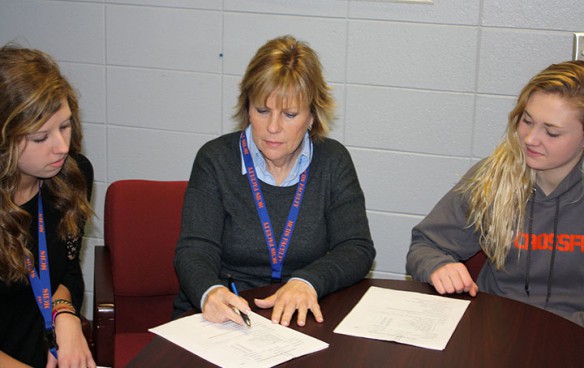
Marshall County High School counselor Elaine Hogancamp, center, works with students Karly Hardin and Karson Johnson at the school. Hogancamp is among the educators helping interested students take advantage of the early graduation option that became available last year.
Photo provided by Marshall County Schools
By Mike Marsee
michael.marsee@education.ky.gov
When students at Marshall County High School started hearing about early graduation, Elaine Hogancamp and Scott Terry fielded two types of questions from two groups of people.
Hogancamp, a guidance counselor at the school, and Scott Terry, an assistant principal there, said students wanted to know what they had to do to leave high school a little early, while parents wanted to know how it would affect their children in college.
The Marshall County educators faced both questions after an early graduation pathway was created by the Kentucky General Assembly last year.
Administrators, counselors and teachers across the state have been asked the same questions, and they said they expect they will be responding to them more and more as students become aware of the early graduation option.
Early graduation isn’t for everyone, but Kelly Clark, who is coordinating the program in the Kentucky Department of Education’s Office of Next Generation Learners, said more students took advantage of the option in its first year than KDE officials had expected.
“Parents have been really excited about this,” Clark said. “We thought we’d have around 100 students when we looked at the data from years past of kids who left who would have been college- and career-ready, but about 300 kids applied the first year.”
The option became available to students when Senate Bill 61 passed the legislature last year. The bill was a companion to SB 97, an act passed last year that requires students to stay in school until they reach age 18 or graduate.
“The idea is if we’re going to make kids stay in school, there should be some mechanism for kids who are ready to graduate not to be punished by that age-18 requirement and to move on when they’re ready,” Clark said.
She said if students meet the requirements for early graduation, that overrides the minimum-credit requirement to graduate. (The state requires a minimum of 22 credits for graduation; individual districts may require more.)
She said students must take the four courses attached to current End-of-Course exams – Algebra II, Biology, English II and U.S. history – and meet proficiency benchmarks on those exams, take the ACT – the early-graduation pathway allows them to take it prior to their junior year at schools’ expense – and meet the benchmarks for college- and career-readiness.
“Of course, we don’t really want students graduating after four courses, so the guidance wrapped around it is that these are kids that typically have a really good idea of what they want to do and why they want to leave early,” Clark said. “So we suggest that they go to the post-secondary institution that they’re interested in and get admission criteria from them, and that admission criteria and what we’re saying they need to leave high school doesn’t always match up.”
Therein lies the difference between what students are asking and what parents are asking in their schools.
“Students want to know what the requirements are, and that’s pretty straightforward,” Hogancamp said.
“Parents’ questions tend to go a little bit further: How is this going to transfer into post-secondary? What do the colleges think? What about scholarships?” Terry added. “It’s better now, but that caused quite a bit of trepidation with some of our junior parents in particular.”
Marshall County had a relatively high number of early graduation applicants, and Hogancamp said the school made it a point to make students aware of the option.
“We’ve always been proactive in letting our students know in 8th grade it would be available to them,” she said. “In high school, in 9th, 10th and 11th grade, we communicated that with the advisers and met with parents.”
However, Terry said school officials were also honest with students interested in early graduation and their parents about whether they though it was right for them.
“I didn’t feel like in these conversations with parents or students I could beat around the bush,” he said. “I needed to be very frank, and I think anybody who wants to do that needs to have those frank conversations.”
Clark said she hopes schools will make students aware of the early graduation pathway before they leave middle school.
“Because what we’re seeing with the types of candidates right now that are enrolling in this, most of them have already taken algebra II as a middle-schooler, and most of them have taken care of biology, either as a middle-schooler or immediately as a freshman,” she said.
Those courses can be important to students headed for pre-medicine or pre-veterinary tracks, and she said those are some of the most likely candidates for early graduation.
“Obviously those students need more than algebra and English. They may need to be in intensive science courses, and they can just really concentrate on the things that will really promote them,” she said.
She said it’s important that early graduation candidates be self-starters and that they have a goal they are working toward, and she said guidance counselors can play a major role in helping students do that.”
Clark said students should not be stuck in a course track when they have already demonstrated proficiency in that subject.
“It’s right in line with what we’ve been saying, which is not every student is cookie-cutter. Every student needs to have some kind of personalized learning plan,” she said. “We ask that they use the ILP (individual learning plan) in a real and meaningful way as part of this. We ask that there be a lot of monitoring, so if they start on this pathway, they can stop if they figure out, ‘Hey, I really want to stay my senior year.’ Whatever the reason, they can leave the pathway and go back to regular status.”
She said teachers can support the process even in middle school by “using the ILP in the classroom instead of a one-time computer lab trip where the students aren’t really involved, and really starting to talk about career interests as early as 6th, 7th and 8th grade, even as early as 5th grade.”
Hogancamp said about 40 Marshall County students initially wanted to apply for early graduation, and the number is now down to about 20. Of those, eight are juniors, and she estimates six of them will graduate this year.
“One is considering staying his senior year to get certifications with some of our technical programs, and one of them is in extracurricular activities,” Hogancamp said.
Clark said about half of the statewide applicants are juniors, about one-quarter are sophomores and about one-quarter are freshmen.
She said it doesn’t matter when they apply, but it does matter that they meet the Oct. 1 deadline if they hope to graduate in the same school year so they can also meet financial aid deadlines set by the Kentucky Higher Education Assistance Authority (KHEAA).
Clark said there can be financial incentives tied to early graduation, and she said KDE is attempting to develop a cost calculation tool to help prospective early graduates determine if the pathway is right for them.
She said students can take dual credit courses that effectively allow them to earn college credit for free. She said there is also a scholarship attached to completion of the early graduation criteria, and students can get up to four years of KEES (Kentucky Educational Excellence Scholarship) money as well.
“That could add up to $2,000 right now, and that’s a good chunk of change,” Clark said.
MORE INFO …
Early Graduation Early Graduation
Kelly Clark kelly.clark@education.ky.gov
Elaine Hogancamp elaine.hogancamp@marshall.kyschools.us
Scott Terry scott.terry@education.ky.gov




My daughter graduated from East Jessamine High School her junior year. She started college that fall graduated and is teaching in Hardin County.
She has never regretted leaving High School early.